Should Australia Adopt Section 172 of the UK Companies Act 2006?
VerifiedAdded on 2023/06/12
|10
|2906
|222
Essay
AI Summary
This essay delves into the duties and obligations of directors within a corporation, focusing on Section 172 of the UK Companies Act 2006 and its potential application in Australia, contrasting it with Section 181 of the Corporations Act 2001. It examines the extent to which directors must act in the best interests of the company, considering stakeholder rights and corporate social responsibility (CSR). The essay references key legal cases and inquiries by the PJC and CAMAC, evaluating the adequacy of existing legislation and the potential ambiguity of Section 172. It concludes by highlighting criticisms of Section 172, particularly concerning vague terminology and the potential for arbitrary interpretation, questioning its viability for practical application in corporate law.
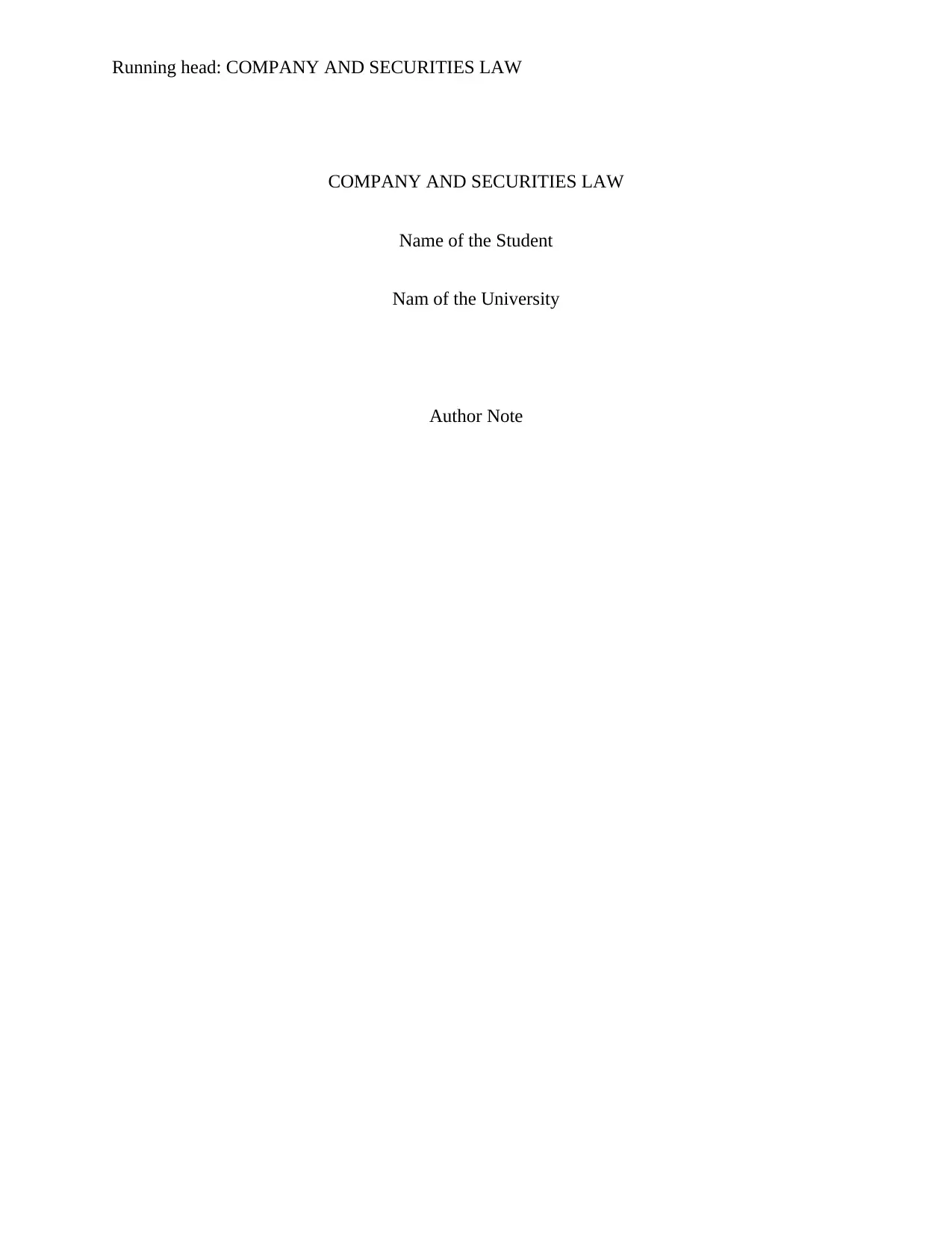
Running head: COMPANY AND SECURITIES LAW
COMPANY AND SECURITIES LAW
Name of the Student
Nam of the University
Author Note
COMPANY AND SECURITIES LAW
Name of the Student
Nam of the University
Author Note
Paraphrase This Document
Need a fresh take? Get an instant paraphrase of this document with our AI Paraphraser
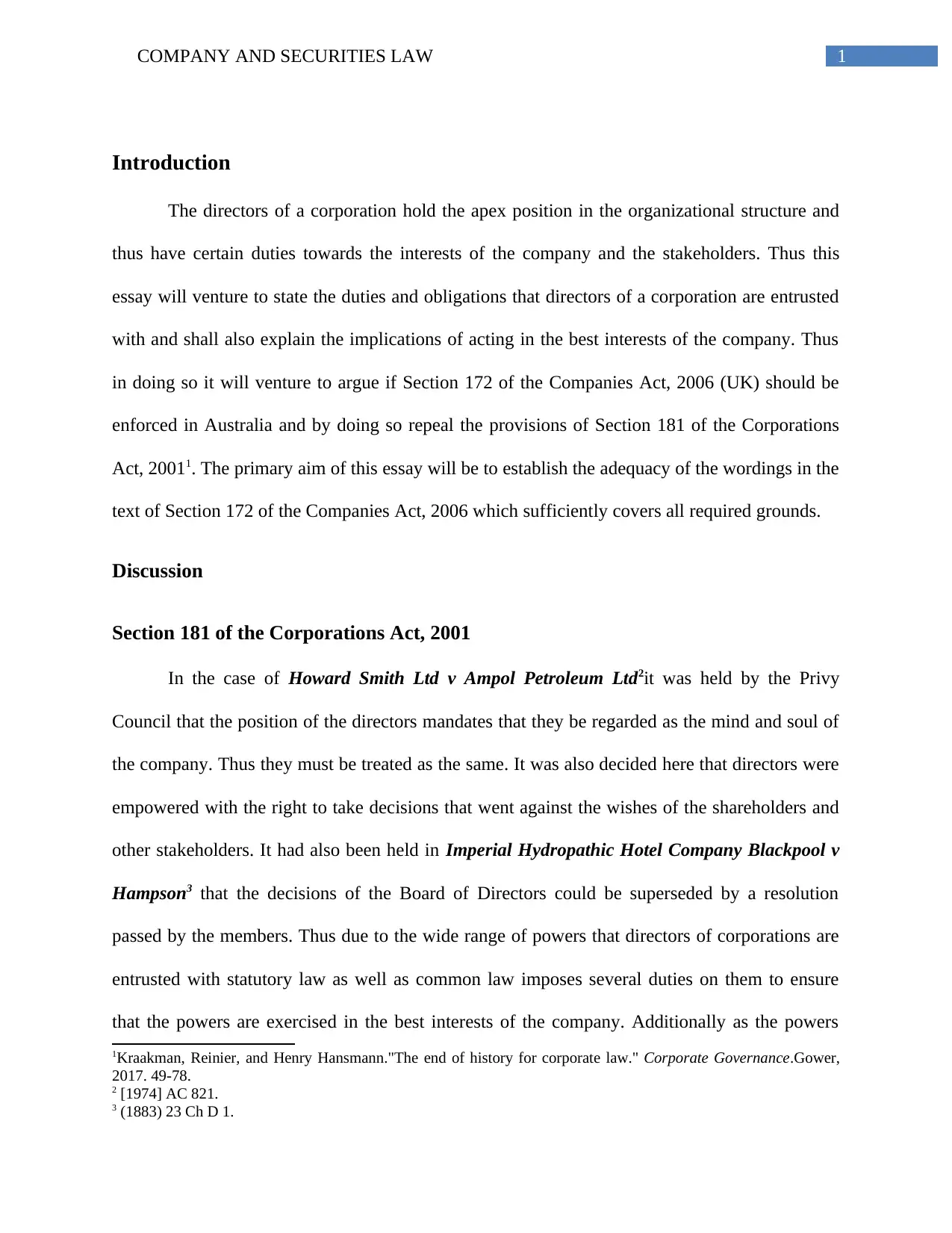
1COMPANY AND SECURITIES LAW
Introduction
The directors of a corporation hold the apex position in the organizational structure and
thus have certain duties towards the interests of the company and the stakeholders. Thus this
essay will venture to state the duties and obligations that directors of a corporation are entrusted
with and shall also explain the implications of acting in the best interests of the company. Thus
in doing so it will venture to argue if Section 172 of the Companies Act, 2006 (UK) should be
enforced in Australia and by doing so repeal the provisions of Section 181 of the Corporations
Act, 20011. The primary aim of this essay will be to establish the adequacy of the wordings in the
text of Section 172 of the Companies Act, 2006 which sufficiently covers all required grounds.
Discussion
Section 181 of the Corporations Act, 2001
In the case of Howard Smith Ltd v Ampol Petroleum Ltd2it was held by the Privy
Council that the position of the directors mandates that they be regarded as the mind and soul of
the company. Thus they must be treated as the same. It was also decided here that directors were
empowered with the right to take decisions that went against the wishes of the shareholders and
other stakeholders. It had also been held in Imperial Hydropathic Hotel Company Blackpool v
Hampson3 that the decisions of the Board of Directors could be superseded by a resolution
passed by the members. Thus due to the wide range of powers that directors of corporations are
entrusted with statutory law as well as common law imposes several duties on them to ensure
that the powers are exercised in the best interests of the company. Additionally as the powers
1Kraakman, Reinier, and Henry Hansmann."The end of history for corporate law." Corporate Governance.Gower,
2017. 49-78.
2 [1974] AC 821.
3 (1883) 23 Ch D 1.
Introduction
The directors of a corporation hold the apex position in the organizational structure and
thus have certain duties towards the interests of the company and the stakeholders. Thus this
essay will venture to state the duties and obligations that directors of a corporation are entrusted
with and shall also explain the implications of acting in the best interests of the company. Thus
in doing so it will venture to argue if Section 172 of the Companies Act, 2006 (UK) should be
enforced in Australia and by doing so repeal the provisions of Section 181 of the Corporations
Act, 20011. The primary aim of this essay will be to establish the adequacy of the wordings in the
text of Section 172 of the Companies Act, 2006 which sufficiently covers all required grounds.
Discussion
Section 181 of the Corporations Act, 2001
In the case of Howard Smith Ltd v Ampol Petroleum Ltd2it was held by the Privy
Council that the position of the directors mandates that they be regarded as the mind and soul of
the company. Thus they must be treated as the same. It was also decided here that directors were
empowered with the right to take decisions that went against the wishes of the shareholders and
other stakeholders. It had also been held in Imperial Hydropathic Hotel Company Blackpool v
Hampson3 that the decisions of the Board of Directors could be superseded by a resolution
passed by the members. Thus due to the wide range of powers that directors of corporations are
entrusted with statutory law as well as common law imposes several duties on them to ensure
that the powers are exercised in the best interests of the company. Additionally as the powers
1Kraakman, Reinier, and Henry Hansmann."The end of history for corporate law." Corporate Governance.Gower,
2017. 49-78.
2 [1974] AC 821.
3 (1883) 23 Ch D 1.
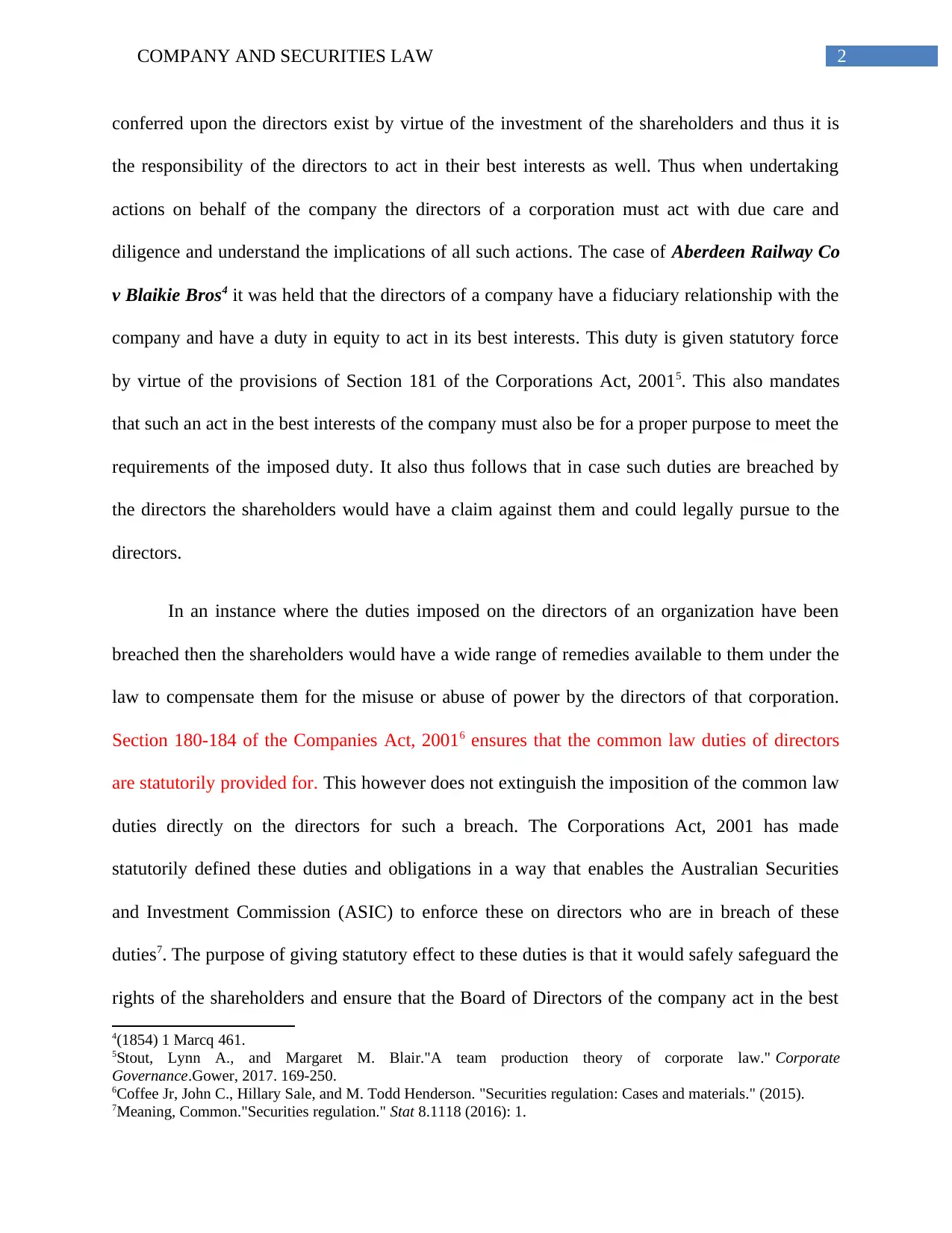
2COMPANY AND SECURITIES LAW
conferred upon the directors exist by virtue of the investment of the shareholders and thus it is
the responsibility of the directors to act in their best interests as well. Thus when undertaking
actions on behalf of the company the directors of a corporation must act with due care and
diligence and understand the implications of all such actions. The case of Aberdeen Railway Co
v Blaikie Bros4 it was held that the directors of a company have a fiduciary relationship with the
company and have a duty in equity to act in its best interests. This duty is given statutory force
by virtue of the provisions of Section 181 of the Corporations Act, 20015. This also mandates
that such an act in the best interests of the company must also be for a proper purpose to meet the
requirements of the imposed duty. It also thus follows that in case such duties are breached by
the directors the shareholders would have a claim against them and could legally pursue to the
directors.
In an instance where the duties imposed on the directors of an organization have been
breached then the shareholders would have a wide range of remedies available to them under the
law to compensate them for the misuse or abuse of power by the directors of that corporation.
Section 180-184 of the Companies Act, 20016 ensures that the common law duties of directors
are statutorily provided for. This however does not extinguish the imposition of the common law
duties directly on the directors for such a breach. The Corporations Act, 2001 has made
statutorily defined these duties and obligations in a way that enables the Australian Securities
and Investment Commission (ASIC) to enforce these on directors who are in breach of these
duties7. The purpose of giving statutory effect to these duties is that it would safely safeguard the
rights of the shareholders and ensure that the Board of Directors of the company act in the best
4(1854) 1 Marcq 461.
5Stout, Lynn A., and Margaret M. Blair."A team production theory of corporate law." Corporate
Governance.Gower, 2017. 169-250.
6Coffee Jr, John C., Hillary Sale, and M. Todd Henderson. "Securities regulation: Cases and materials." (2015).
7Meaning, Common."Securities regulation." Stat 8.1118 (2016): 1.
conferred upon the directors exist by virtue of the investment of the shareholders and thus it is
the responsibility of the directors to act in their best interests as well. Thus when undertaking
actions on behalf of the company the directors of a corporation must act with due care and
diligence and understand the implications of all such actions. The case of Aberdeen Railway Co
v Blaikie Bros4 it was held that the directors of a company have a fiduciary relationship with the
company and have a duty in equity to act in its best interests. This duty is given statutory force
by virtue of the provisions of Section 181 of the Corporations Act, 20015. This also mandates
that such an act in the best interests of the company must also be for a proper purpose to meet the
requirements of the imposed duty. It also thus follows that in case such duties are breached by
the directors the shareholders would have a claim against them and could legally pursue to the
directors.
In an instance where the duties imposed on the directors of an organization have been
breached then the shareholders would have a wide range of remedies available to them under the
law to compensate them for the misuse or abuse of power by the directors of that corporation.
Section 180-184 of the Companies Act, 20016 ensures that the common law duties of directors
are statutorily provided for. This however does not extinguish the imposition of the common law
duties directly on the directors for such a breach. The Corporations Act, 2001 has made
statutorily defined these duties and obligations in a way that enables the Australian Securities
and Investment Commission (ASIC) to enforce these on directors who are in breach of these
duties7. The purpose of giving statutory effect to these duties is that it would safely safeguard the
rights of the shareholders and ensure that the Board of Directors of the company act in the best
4(1854) 1 Marcq 461.
5Stout, Lynn A., and Margaret M. Blair."A team production theory of corporate law." Corporate
Governance.Gower, 2017. 169-250.
6Coffee Jr, John C., Hillary Sale, and M. Todd Henderson. "Securities regulation: Cases and materials." (2015).
7Meaning, Common."Securities regulation." Stat 8.1118 (2016): 1.
⊘ This is a preview!⊘
Do you want full access?
Subscribe today to unlock all pages.

Trusted by 1+ million students worldwide
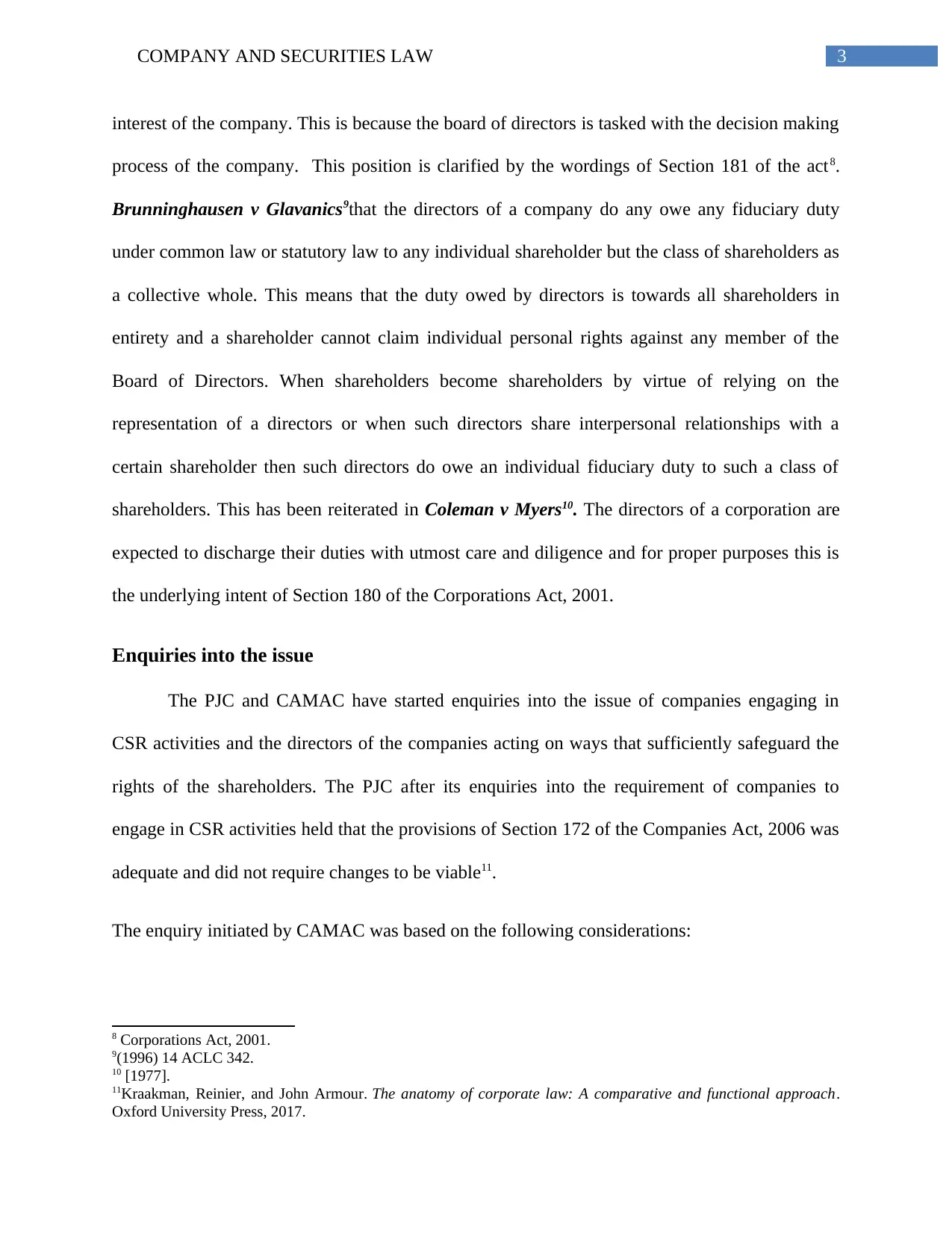
3COMPANY AND SECURITIES LAW
interest of the company. This is because the board of directors is tasked with the decision making
process of the company. This position is clarified by the wordings of Section 181 of the act8.
Brunninghausen v Glavanics9that the directors of a company do any owe any fiduciary duty
under common law or statutory law to any individual shareholder but the class of shareholders as
a collective whole. This means that the duty owed by directors is towards all shareholders in
entirety and a shareholder cannot claim individual personal rights against any member of the
Board of Directors. When shareholders become shareholders by virtue of relying on the
representation of a directors or when such directors share interpersonal relationships with a
certain shareholder then such directors do owe an individual fiduciary duty to such a class of
shareholders. This has been reiterated in Coleman v Myers10. The directors of a corporation are
expected to discharge their duties with utmost care and diligence and for proper purposes this is
the underlying intent of Section 180 of the Corporations Act, 2001.
Enquiries into the issue
The PJC and CAMAC have started enquiries into the issue of companies engaging in
CSR activities and the directors of the companies acting on ways that sufficiently safeguard the
rights of the shareholders. The PJC after its enquiries into the requirement of companies to
engage in CSR activities held that the provisions of Section 172 of the Companies Act, 2006 was
adequate and did not require changes to be viable11.
The enquiry initiated by CAMAC was based on the following considerations:
8 Corporations Act, 2001.
9(1996) 14 ACLC 342.
10 [1977].
11Kraakman, Reinier, and John Armour. The anatomy of corporate law: A comparative and functional approach.
Oxford University Press, 2017.
interest of the company. This is because the board of directors is tasked with the decision making
process of the company. This position is clarified by the wordings of Section 181 of the act8.
Brunninghausen v Glavanics9that the directors of a company do any owe any fiduciary duty
under common law or statutory law to any individual shareholder but the class of shareholders as
a collective whole. This means that the duty owed by directors is towards all shareholders in
entirety and a shareholder cannot claim individual personal rights against any member of the
Board of Directors. When shareholders become shareholders by virtue of relying on the
representation of a directors or when such directors share interpersonal relationships with a
certain shareholder then such directors do owe an individual fiduciary duty to such a class of
shareholders. This has been reiterated in Coleman v Myers10. The directors of a corporation are
expected to discharge their duties with utmost care and diligence and for proper purposes this is
the underlying intent of Section 180 of the Corporations Act, 2001.
Enquiries into the issue
The PJC and CAMAC have started enquiries into the issue of companies engaging in
CSR activities and the directors of the companies acting on ways that sufficiently safeguard the
rights of the shareholders. The PJC after its enquiries into the requirement of companies to
engage in CSR activities held that the provisions of Section 172 of the Companies Act, 2006 was
adequate and did not require changes to be viable11.
The enquiry initiated by CAMAC was based on the following considerations:
8 Corporations Act, 2001.
9(1996) 14 ACLC 342.
10 [1977].
11Kraakman, Reinier, and John Armour. The anatomy of corporate law: A comparative and functional approach.
Oxford University Press, 2017.
Paraphrase This Document
Need a fresh take? Get an instant paraphrase of this document with our AI Paraphraser
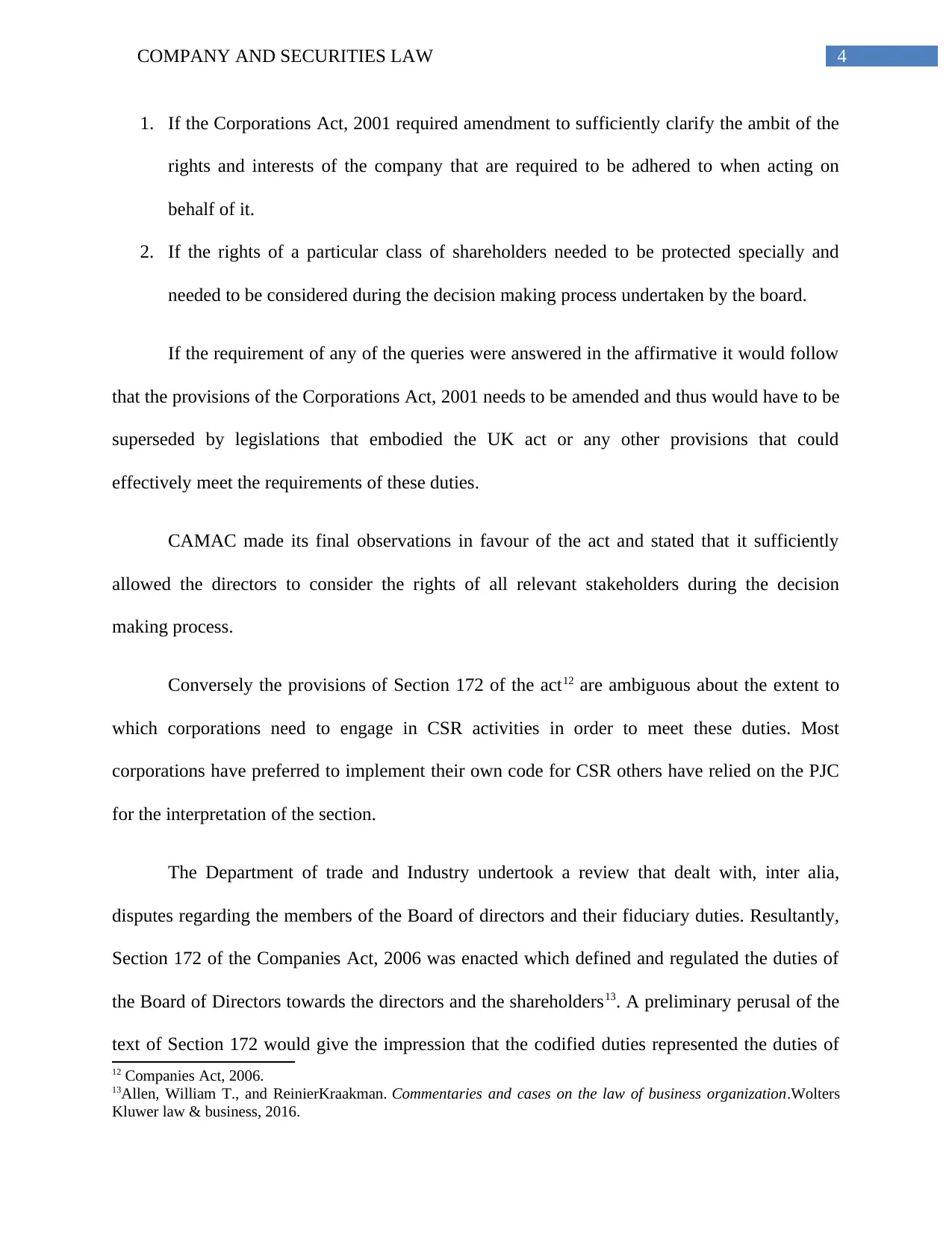
4COMPANY AND SECURITIES LAW
1. If the Corporations Act, 2001 required amendment to sufficiently clarify the ambit of the
rights and interests of the company that are required to be adhered to when acting on
behalf of it.
2. If the rights of a particular class of shareholders needed to be protected specially and
needed to be considered during the decision making process undertaken by the board.
If the requirement of any of the queries were answered in the affirmative it would follow
that the provisions of the Corporations Act, 2001 needs to be amended and thus would have to be
superseded by legislations that embodied the UK act or any other provisions that could
effectively meet the requirements of these duties.
CAMAC made its final observations in favour of the act and stated that it sufficiently
allowed the directors to consider the rights of all relevant stakeholders during the decision
making process.
Conversely the provisions of Section 172 of the act12 are ambiguous about the extent to
which corporations need to engage in CSR activities in order to meet these duties. Most
corporations have preferred to implement their own code for CSR others have relied on the PJC
for the interpretation of the section.
The Department of trade and Industry undertook a review that dealt with, inter alia,
disputes regarding the members of the Board of directors and their fiduciary duties. Resultantly,
Section 172 of the Companies Act, 2006 was enacted which defined and regulated the duties of
the Board of Directors towards the directors and the shareholders13. A preliminary perusal of the
text of Section 172 would give the impression that the codified duties represented the duties of
12 Companies Act, 2006.
13Allen, William T., and ReinierKraakman. Commentaries and cases on the law of business organization.Wolters
Kluwer law & business, 2016.
1. If the Corporations Act, 2001 required amendment to sufficiently clarify the ambit of the
rights and interests of the company that are required to be adhered to when acting on
behalf of it.
2. If the rights of a particular class of shareholders needed to be protected specially and
needed to be considered during the decision making process undertaken by the board.
If the requirement of any of the queries were answered in the affirmative it would follow
that the provisions of the Corporations Act, 2001 needs to be amended and thus would have to be
superseded by legislations that embodied the UK act or any other provisions that could
effectively meet the requirements of these duties.
CAMAC made its final observations in favour of the act and stated that it sufficiently
allowed the directors to consider the rights of all relevant stakeholders during the decision
making process.
Conversely the provisions of Section 172 of the act12 are ambiguous about the extent to
which corporations need to engage in CSR activities in order to meet these duties. Most
corporations have preferred to implement their own code for CSR others have relied on the PJC
for the interpretation of the section.
The Department of trade and Industry undertook a review that dealt with, inter alia,
disputes regarding the members of the Board of directors and their fiduciary duties. Resultantly,
Section 172 of the Companies Act, 2006 was enacted which defined and regulated the duties of
the Board of Directors towards the directors and the shareholders13. A preliminary perusal of the
text of Section 172 would give the impression that the codified duties represented the duties of
12 Companies Act, 2006.
13Allen, William T., and ReinierKraakman. Commentaries and cases on the law of business organization.Wolters
Kluwer law & business, 2016.
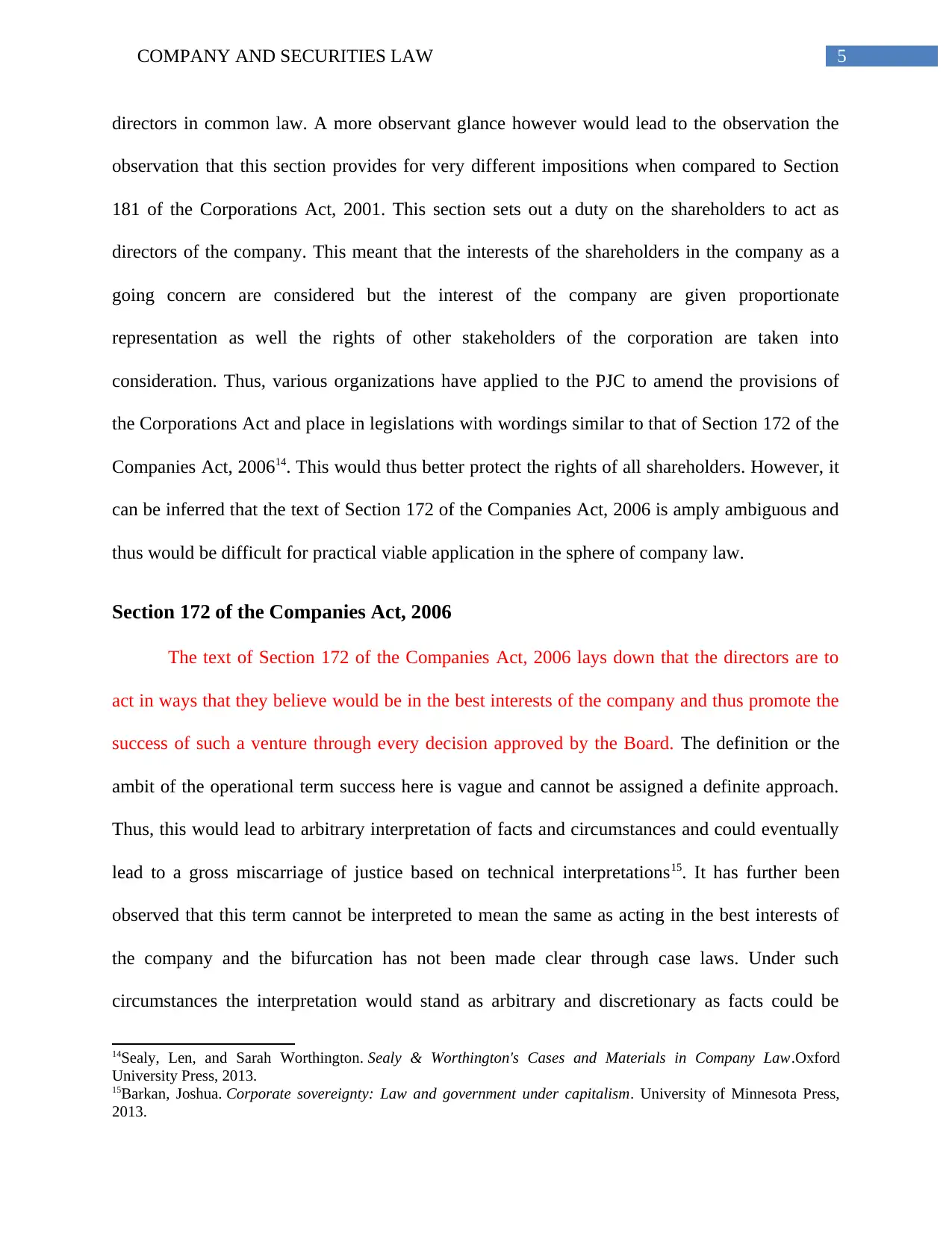
5COMPANY AND SECURITIES LAW
directors in common law. A more observant glance however would lead to the observation the
observation that this section provides for very different impositions when compared to Section
181 of the Corporations Act, 2001. This section sets out a duty on the shareholders to act as
directors of the company. This meant that the interests of the shareholders in the company as a
going concern are considered but the interest of the company are given proportionate
representation as well the rights of other stakeholders of the corporation are taken into
consideration. Thus, various organizations have applied to the PJC to amend the provisions of
the Corporations Act and place in legislations with wordings similar to that of Section 172 of the
Companies Act, 200614. This would thus better protect the rights of all shareholders. However, it
can be inferred that the text of Section 172 of the Companies Act, 2006 is amply ambiguous and
thus would be difficult for practical viable application in the sphere of company law.
Section 172 of the Companies Act, 2006
The text of Section 172 of the Companies Act, 2006 lays down that the directors are to
act in ways that they believe would be in the best interests of the company and thus promote the
success of such a venture through every decision approved by the Board. The definition or the
ambit of the operational term success here is vague and cannot be assigned a definite approach.
Thus, this would lead to arbitrary interpretation of facts and circumstances and could eventually
lead to a gross miscarriage of justice based on technical interpretations15. It has further been
observed that this term cannot be interpreted to mean the same as acting in the best interests of
the company and the bifurcation has not been made clear through case laws. Under such
circumstances the interpretation would stand as arbitrary and discretionary as facts could be
14Sealy, Len, and Sarah Worthington. Sealy & Worthington's Cases and Materials in Company Law.Oxford
University Press, 2013.
15Barkan, Joshua. Corporate sovereignty: Law and government under capitalism. University of Minnesota Press,
2013.
directors in common law. A more observant glance however would lead to the observation the
observation that this section provides for very different impositions when compared to Section
181 of the Corporations Act, 2001. This section sets out a duty on the shareholders to act as
directors of the company. This meant that the interests of the shareholders in the company as a
going concern are considered but the interest of the company are given proportionate
representation as well the rights of other stakeholders of the corporation are taken into
consideration. Thus, various organizations have applied to the PJC to amend the provisions of
the Corporations Act and place in legislations with wordings similar to that of Section 172 of the
Companies Act, 200614. This would thus better protect the rights of all shareholders. However, it
can be inferred that the text of Section 172 of the Companies Act, 2006 is amply ambiguous and
thus would be difficult for practical viable application in the sphere of company law.
Section 172 of the Companies Act, 2006
The text of Section 172 of the Companies Act, 2006 lays down that the directors are to
act in ways that they believe would be in the best interests of the company and thus promote the
success of such a venture through every decision approved by the Board. The definition or the
ambit of the operational term success here is vague and cannot be assigned a definite approach.
Thus, this would lead to arbitrary interpretation of facts and circumstances and could eventually
lead to a gross miscarriage of justice based on technical interpretations15. It has further been
observed that this term cannot be interpreted to mean the same as acting in the best interests of
the company and the bifurcation has not been made clear through case laws. Under such
circumstances the interpretation would stand as arbitrary and discretionary as facts could be
14Sealy, Len, and Sarah Worthington. Sealy & Worthington's Cases and Materials in Company Law.Oxford
University Press, 2013.
15Barkan, Joshua. Corporate sovereignty: Law and government under capitalism. University of Minnesota Press,
2013.
⊘ This is a preview!⊘
Do you want full access?
Subscribe today to unlock all pages.

Trusted by 1+ million students worldwide
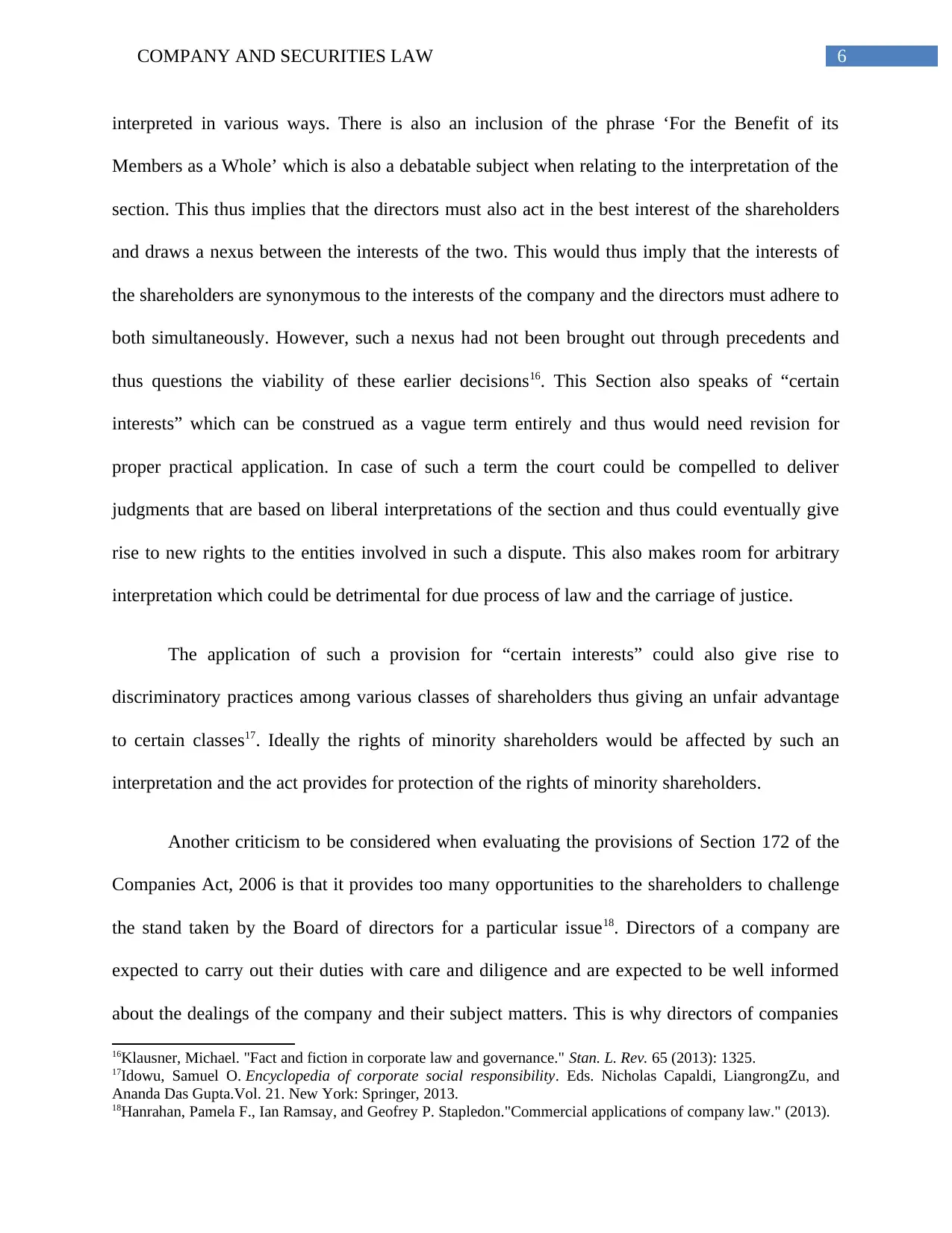
6COMPANY AND SECURITIES LAW
interpreted in various ways. There is also an inclusion of the phrase ‘For the Benefit of its
Members as a Whole’ which is also a debatable subject when relating to the interpretation of the
section. This thus implies that the directors must also act in the best interest of the shareholders
and draws a nexus between the interests of the two. This would thus imply that the interests of
the shareholders are synonymous to the interests of the company and the directors must adhere to
both simultaneously. However, such a nexus had not been brought out through precedents and
thus questions the viability of these earlier decisions16. This Section also speaks of “certain
interests” which can be construed as a vague term entirely and thus would need revision for
proper practical application. In case of such a term the court could be compelled to deliver
judgments that are based on liberal interpretations of the section and thus could eventually give
rise to new rights to the entities involved in such a dispute. This also makes room for arbitrary
interpretation which could be detrimental for due process of law and the carriage of justice.
The application of such a provision for “certain interests” could also give rise to
discriminatory practices among various classes of shareholders thus giving an unfair advantage
to certain classes17. Ideally the rights of minority shareholders would be affected by such an
interpretation and the act provides for protection of the rights of minority shareholders.
Another criticism to be considered when evaluating the provisions of Section 172 of the
Companies Act, 2006 is that it provides too many opportunities to the shareholders to challenge
the stand taken by the Board of directors for a particular issue18. Directors of a company are
expected to carry out their duties with care and diligence and are expected to be well informed
about the dealings of the company and their subject matters. This is why directors of companies
16Klausner, Michael. "Fact and fiction in corporate law and governance." Stan. L. Rev. 65 (2013): 1325.
17Idowu, Samuel O. Encyclopedia of corporate social responsibility. Eds. Nicholas Capaldi, LiangrongZu, and
Ananda Das Gupta.Vol. 21. New York: Springer, 2013.
18Hanrahan, Pamela F., Ian Ramsay, and Geofrey P. Stapledon."Commercial applications of company law." (2013).
interpreted in various ways. There is also an inclusion of the phrase ‘For the Benefit of its
Members as a Whole’ which is also a debatable subject when relating to the interpretation of the
section. This thus implies that the directors must also act in the best interest of the shareholders
and draws a nexus between the interests of the two. This would thus imply that the interests of
the shareholders are synonymous to the interests of the company and the directors must adhere to
both simultaneously. However, such a nexus had not been brought out through precedents and
thus questions the viability of these earlier decisions16. This Section also speaks of “certain
interests” which can be construed as a vague term entirely and thus would need revision for
proper practical application. In case of such a term the court could be compelled to deliver
judgments that are based on liberal interpretations of the section and thus could eventually give
rise to new rights to the entities involved in such a dispute. This also makes room for arbitrary
interpretation which could be detrimental for due process of law and the carriage of justice.
The application of such a provision for “certain interests” could also give rise to
discriminatory practices among various classes of shareholders thus giving an unfair advantage
to certain classes17. Ideally the rights of minority shareholders would be affected by such an
interpretation and the act provides for protection of the rights of minority shareholders.
Another criticism to be considered when evaluating the provisions of Section 172 of the
Companies Act, 2006 is that it provides too many opportunities to the shareholders to challenge
the stand taken by the Board of directors for a particular issue18. Directors of a company are
expected to carry out their duties with care and diligence and are expected to be well informed
about the dealings of the company and their subject matters. This is why directors of companies
16Klausner, Michael. "Fact and fiction in corporate law and governance." Stan. L. Rev. 65 (2013): 1325.
17Idowu, Samuel O. Encyclopedia of corporate social responsibility. Eds. Nicholas Capaldi, LiangrongZu, and
Ananda Das Gupta.Vol. 21. New York: Springer, 2013.
18Hanrahan, Pamela F., Ian Ramsay, and Geofrey P. Stapledon."Commercial applications of company law." (2013).
Paraphrase This Document
Need a fresh take? Get an instant paraphrase of this document with our AI Paraphraser
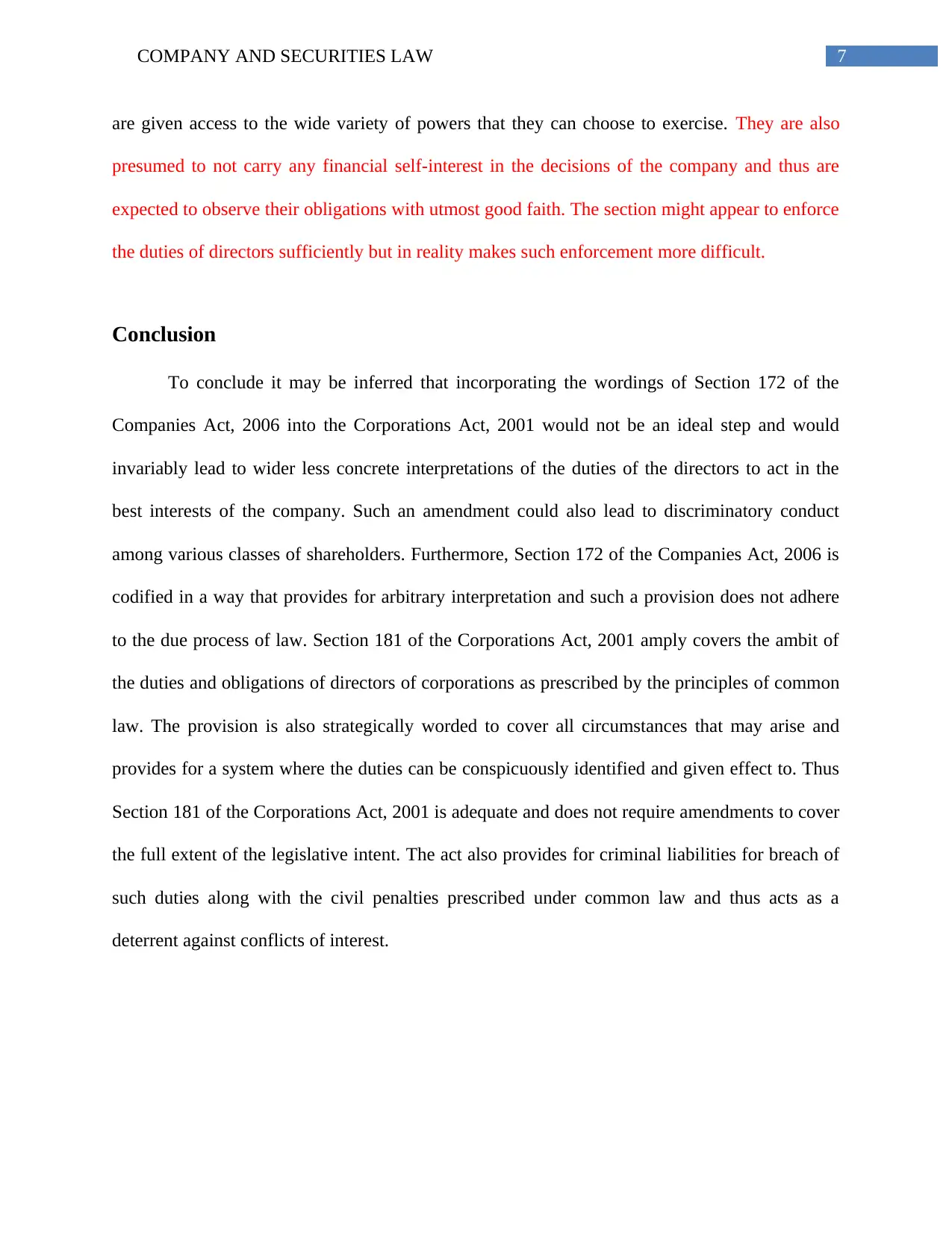
7COMPANY AND SECURITIES LAW
are given access to the wide variety of powers that they can choose to exercise. They are also
presumed to not carry any financial self-interest in the decisions of the company and thus are
expected to observe their obligations with utmost good faith. The section might appear to enforce
the duties of directors sufficiently but in reality makes such enforcement more difficult.
Conclusion
To conclude it may be inferred that incorporating the wordings of Section 172 of the
Companies Act, 2006 into the Corporations Act, 2001 would not be an ideal step and would
invariably lead to wider less concrete interpretations of the duties of the directors to act in the
best interests of the company. Such an amendment could also lead to discriminatory conduct
among various classes of shareholders. Furthermore, Section 172 of the Companies Act, 2006 is
codified in a way that provides for arbitrary interpretation and such a provision does not adhere
to the due process of law. Section 181 of the Corporations Act, 2001 amply covers the ambit of
the duties and obligations of directors of corporations as prescribed by the principles of common
law. The provision is also strategically worded to cover all circumstances that may arise and
provides for a system where the duties can be conspicuously identified and given effect to. Thus
Section 181 of the Corporations Act, 2001 is adequate and does not require amendments to cover
the full extent of the legislative intent. The act also provides for criminal liabilities for breach of
such duties along with the civil penalties prescribed under common law and thus acts as a
deterrent against conflicts of interest.
are given access to the wide variety of powers that they can choose to exercise. They are also
presumed to not carry any financial self-interest in the decisions of the company and thus are
expected to observe their obligations with utmost good faith. The section might appear to enforce
the duties of directors sufficiently but in reality makes such enforcement more difficult.
Conclusion
To conclude it may be inferred that incorporating the wordings of Section 172 of the
Companies Act, 2006 into the Corporations Act, 2001 would not be an ideal step and would
invariably lead to wider less concrete interpretations of the duties of the directors to act in the
best interests of the company. Such an amendment could also lead to discriminatory conduct
among various classes of shareholders. Furthermore, Section 172 of the Companies Act, 2006 is
codified in a way that provides for arbitrary interpretation and such a provision does not adhere
to the due process of law. Section 181 of the Corporations Act, 2001 amply covers the ambit of
the duties and obligations of directors of corporations as prescribed by the principles of common
law. The provision is also strategically worded to cover all circumstances that may arise and
provides for a system where the duties can be conspicuously identified and given effect to. Thus
Section 181 of the Corporations Act, 2001 is adequate and does not require amendments to cover
the full extent of the legislative intent. The act also provides for criminal liabilities for breach of
such duties along with the civil penalties prescribed under common law and thus acts as a
deterrent against conflicts of interest.
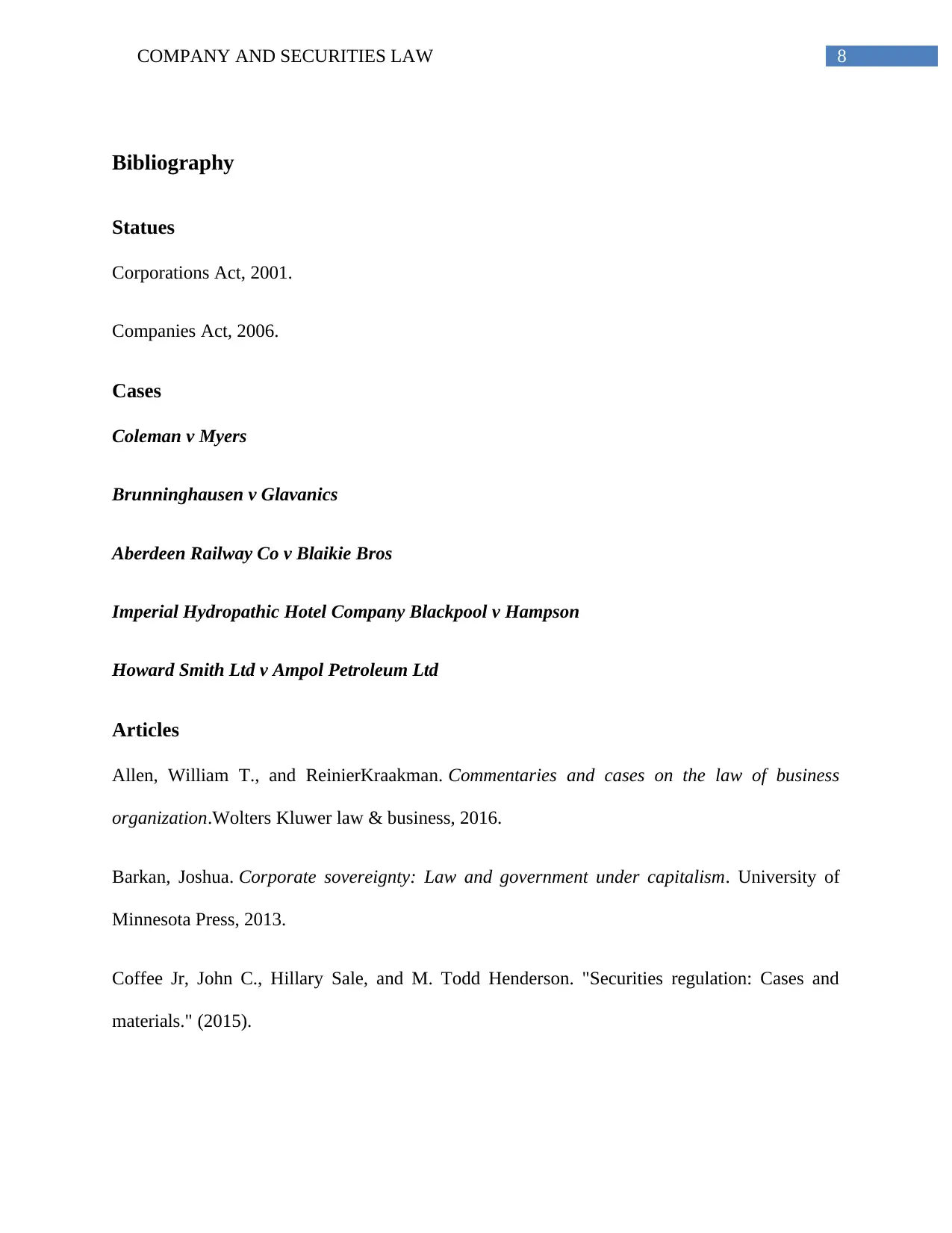
8COMPANY AND SECURITIES LAW
Bibliography
Statues
Corporations Act, 2001.
Companies Act, 2006.
Cases
Coleman v Myers
Brunninghausen v Glavanics
Aberdeen Railway Co v Blaikie Bros
Imperial Hydropathic Hotel Company Blackpool v Hampson
Howard Smith Ltd v Ampol Petroleum Ltd
Articles
Allen, William T., and ReinierKraakman. Commentaries and cases on the law of business
organization.Wolters Kluwer law & business, 2016.
Barkan, Joshua. Corporate sovereignty: Law and government under capitalism. University of
Minnesota Press, 2013.
Coffee Jr, John C., Hillary Sale, and M. Todd Henderson. "Securities regulation: Cases and
materials." (2015).
Bibliography
Statues
Corporations Act, 2001.
Companies Act, 2006.
Cases
Coleman v Myers
Brunninghausen v Glavanics
Aberdeen Railway Co v Blaikie Bros
Imperial Hydropathic Hotel Company Blackpool v Hampson
Howard Smith Ltd v Ampol Petroleum Ltd
Articles
Allen, William T., and ReinierKraakman. Commentaries and cases on the law of business
organization.Wolters Kluwer law & business, 2016.
Barkan, Joshua. Corporate sovereignty: Law and government under capitalism. University of
Minnesota Press, 2013.
Coffee Jr, John C., Hillary Sale, and M. Todd Henderson. "Securities regulation: Cases and
materials." (2015).
⊘ This is a preview!⊘
Do you want full access?
Subscribe today to unlock all pages.

Trusted by 1+ million students worldwide
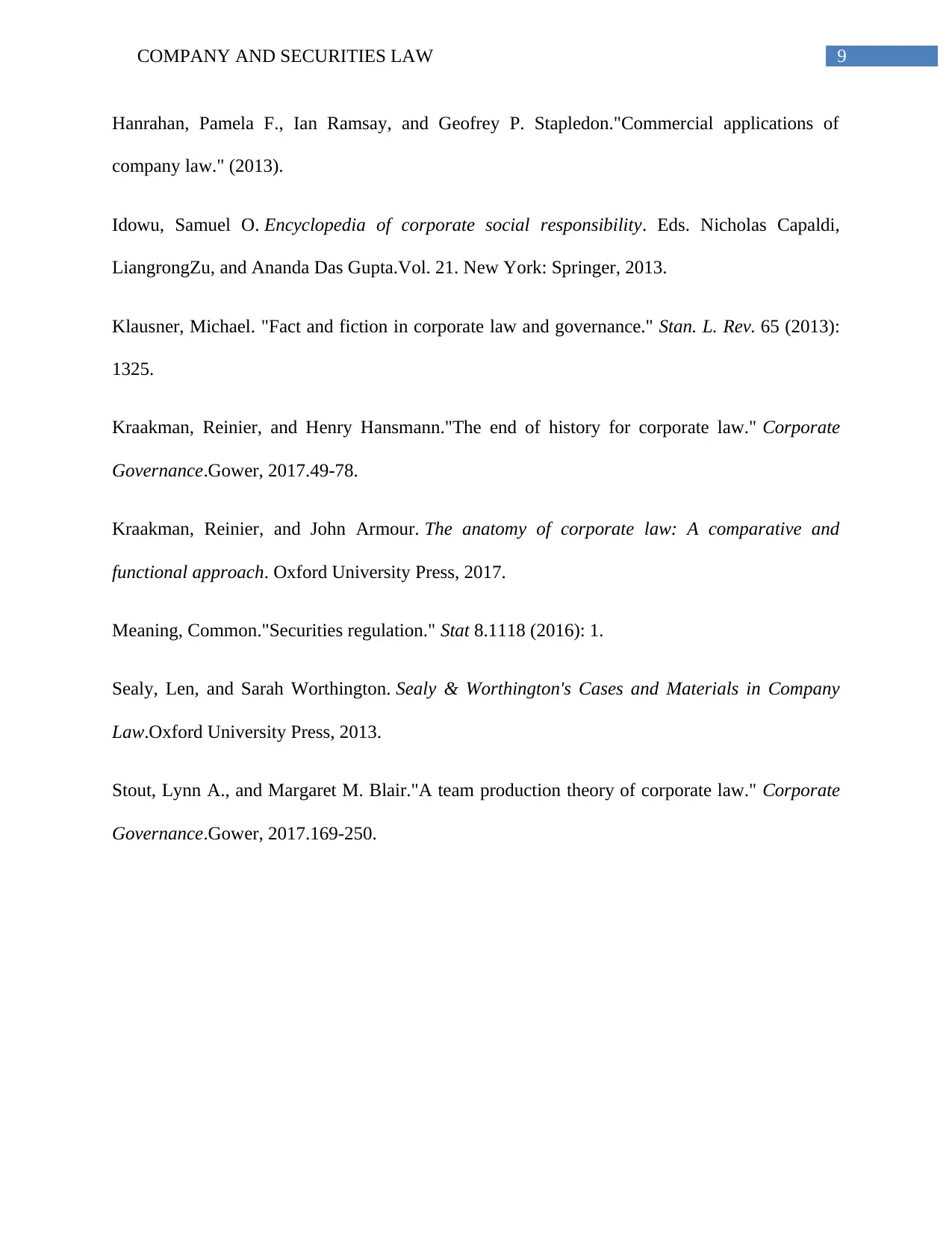
9COMPANY AND SECURITIES LAW
Hanrahan, Pamela F., Ian Ramsay, and Geofrey P. Stapledon."Commercial applications of
company law." (2013).
Idowu, Samuel O. Encyclopedia of corporate social responsibility. Eds. Nicholas Capaldi,
LiangrongZu, and Ananda Das Gupta.Vol. 21. New York: Springer, 2013.
Klausner, Michael. "Fact and fiction in corporate law and governance." Stan. L. Rev. 65 (2013):
1325.
Kraakman, Reinier, and Henry Hansmann."The end of history for corporate law." Corporate
Governance.Gower, 2017.49-78.
Kraakman, Reinier, and John Armour. The anatomy of corporate law: A comparative and
functional approach. Oxford University Press, 2017.
Meaning, Common."Securities regulation." Stat 8.1118 (2016): 1.
Sealy, Len, and Sarah Worthington. Sealy & Worthington's Cases and Materials in Company
Law.Oxford University Press, 2013.
Stout, Lynn A., and Margaret M. Blair."A team production theory of corporate law." Corporate
Governance.Gower, 2017.169-250.
Hanrahan, Pamela F., Ian Ramsay, and Geofrey P. Stapledon."Commercial applications of
company law." (2013).
Idowu, Samuel O. Encyclopedia of corporate social responsibility. Eds. Nicholas Capaldi,
LiangrongZu, and Ananda Das Gupta.Vol. 21. New York: Springer, 2013.
Klausner, Michael. "Fact and fiction in corporate law and governance." Stan. L. Rev. 65 (2013):
1325.
Kraakman, Reinier, and Henry Hansmann."The end of history for corporate law." Corporate
Governance.Gower, 2017.49-78.
Kraakman, Reinier, and John Armour. The anatomy of corporate law: A comparative and
functional approach. Oxford University Press, 2017.
Meaning, Common."Securities regulation." Stat 8.1118 (2016): 1.
Sealy, Len, and Sarah Worthington. Sealy & Worthington's Cases and Materials in Company
Law.Oxford University Press, 2013.
Stout, Lynn A., and Margaret M. Blair."A team production theory of corporate law." Corporate
Governance.Gower, 2017.169-250.
1 out of 10
Related Documents
Your All-in-One AI-Powered Toolkit for Academic Success.
+13062052269
info@desklib.com
Available 24*7 on WhatsApp / Email
![[object Object]](/_next/static/media/star-bottom.7253800d.svg)
Unlock your academic potential
Copyright © 2020–2026 A2Z Services. All Rights Reserved. Developed and managed by ZUCOL.





